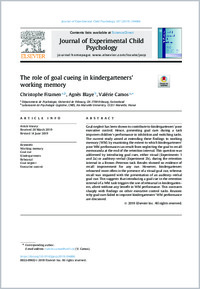The role of goal cueing in kindergarteners' working memory
- Fitamen, Christophe Université de Fribourg
- Blaye, Agnès Université Aix-Marseille
- Camos, Valérie Université de Fribourg
-
2019
Published in:
- Journal of Experimental Child Psychology. - 2019, vol. 187, p. 1-16
English
Goal neglect has been shown to contribute to kindergarteners’ poor executive control. Hence, presenting goal cues during a task improves children’s performance in inhibition and switching tasks. The current study aimed at extending these findings to working memory (WM) by examining the extent to which kindergarteners’ poor WM performance can result from neglecting the goal to recall memoranda at the end of the retention interval. This question was addressed by introducing goal cues, either visual (Experiments 1 and 2a) or auditory–verbal (Experiment 2b), during the retention interval in a Brown–Peterson task. Results showed no evidence of recall improvement for any cue. However, kindergarteners rehearsed more often in the presence of a visual goal cue, whereas recall was impaired with the presentation of an auditory–verbal goal cue. This suggests that introducing a goal cue in the retention interval of a WM task triggers the use of rehearsal in kindergarteners, albeit without any benefit in WM performance. This contrasts sharply with findings on other executive control tasks. Reasons why goal cues failed to improve kindergarteners’ WMperformance are discussed.
- Faculty
- Faculté des lettres et des sciences humaines
- Department
- Département de Psychologie
- Language
-
- English
- Classification
- Psychology
- License
-
License undefined
- Identifiers
-
- RERO DOC 329894
- DOI 10.1016/j.jecp.2019.104666
- Persistent URL
- https://folia.unifr.ch/unifr/documents/309078
Statistics
Document views: 149
File downloads:
- Texte intégral: 319
